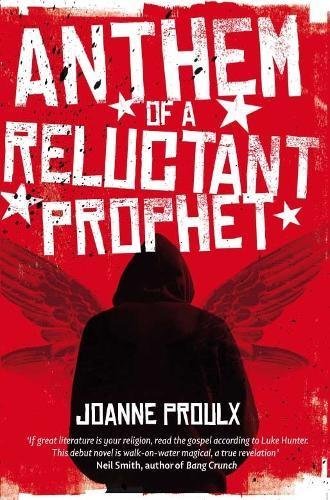What do you think?
Rate this book


368 pages, Paperback
First published April 30, 2007
Anthem of a Reluctant Prophet is a novel that looks into the life of Luke Hunter, a self-proclaimed “loser” problem child. It deals with everything an average teenage boy might deal with in everyday life and more. It talks about family, school, sex, drugs and religion and the list can go on. What makes Joanne Proulx’s story unique from all the other teenage novels, besides dealing with the endless problems of daily life, is that she spices things up by adding a pinch of premonition à la death.
What was interesting about this novel was the voice of the story. It was written in first person point of view, but the way Luke is portrayed makes the story more appealing. Luke is not any ordinary character you’d see in a regular book. The rawness of his persona draws readers in; making them wonder what he might say or do next. He openly swears and is harshly opinionated, like a true teenager of our era. For example, even in the first sentence of the book, profanity is evident; “The first time it happened, I was bullshitting.” (Proulx 1) The realness of Luke’s character is what keeps readers entertained and why it is easy to relate to him. He is an out-of-control character who can’t get a hold of himself because of the visions he has of people— strangers— dying.
What I was not particular about in this novel was the bias against the Church. Although I am not religious, the strong negativity towards the Christian community was burdensome for me as a reader. I felt as if an opinion was being shoved down my throat whenever it spoke about the Pastor and his constant nagging for Christian conformity. An example of this is Pastor Ted saying to Luke, “You have a gift, but you’ve made some bad choices— failing to accept Christ into your life, for one— which have left you vulnerable.” (Proulx 309) Anti-religion is a teenage rebellion cliché, but the intensity of it used it this book was overwhelming. Besides that fact, overall the novel is a decent one, and its play on paranormal activities is intriguing, though unrealistic.